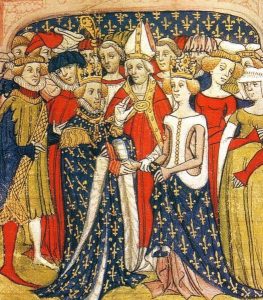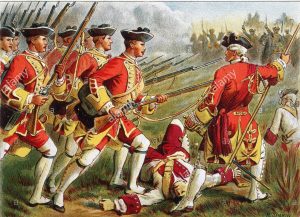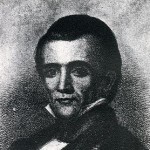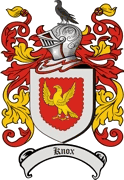aristocracy
 Most people think that English came from England, and of course, it did, however, in England prior to the 19th century, the English language was not spoken by the aristocracy, but rather only by “commoners.” Back then, English used to belong to the people, and I suppose that might explain some of the “incorrect” uses of the language which have been so severely attacked by contemporary English speakers. Prior to the 19th century, the aristocracy in English courts spoke French. This was due to the Norman Invasion of 1066 and caused years of division between the “gentlemen” who had adopted the Anglo-Norman French and those who only spoke English. Even the famed King Richard the Lionheart was actually primarily referred to in French, as Richard “Coeur de Lion.”
Most people think that English came from England, and of course, it did, however, in England prior to the 19th century, the English language was not spoken by the aristocracy, but rather only by “commoners.” Back then, English used to belong to the people, and I suppose that might explain some of the “incorrect” uses of the language which have been so severely attacked by contemporary English speakers. Prior to the 19th century, the aristocracy in English courts spoke French. This was due to the Norman Invasion of 1066 and caused years of division between the “gentlemen” who had adopted the Anglo-Norman French and those who only spoke English. Even the famed King Richard the Lionheart was actually primarily referred to in French, as Richard “Coeur de Lion.”
In my opinion, this dual language society would have caused numerous problems. The indication I get is that neither side could speak the language of the other, but I don’t know how a monarchy could rule, if the “commoners” could not understand the language and therefore the orders of the monarchy. French was spoken and learned by anyone in the upper  classes. However, it became less useful as English lost its control of various places in France, where the peasants spoke French, too. After that…about, 1450…English was simply more useful for talking to anybody. It is still true that British royals and many nobles are fluent in French, but they only use it to talk to French people, just like everybody else.
classes. However, it became less useful as English lost its control of various places in France, where the peasants spoke French, too. After that…about, 1450…English was simply more useful for talking to anybody. It is still true that British royals and many nobles are fluent in French, but they only use it to talk to French people, just like everybody else.
To further confuse your preconceptions about the English language, the “British accent” was, in reality, created after the Revolutionary War, meaning contemporary Americans sound more like the colonists and British soldiers of the 18th century than contemporary Brits. Many people have made a point of how much they love the British accent, but I think very few people know the real story behind the British accent. In the 18th century and before, the British “accent” was the way we speak herein America. Of course, accents vary greatly  by region, as we have seen with the accents of the south and east in the United States, but the “BBC English” or public school English accent…which sounds like the James Bond movies…didn’t come about until the 19th century and was originally adopted by people who wanted to sound fancier. I suppose it was like the aristocracy and the commoners, in that one group didn’t want to be mistaken for the other. After being handily defeated by the American colonists, I’m sure that the British were looking for a way to seem superior, even in defeat. The change in the accent of the English language was sufficient to make that distinction. Maybe it was their way of saying that they were better than the American guerilla-type soldiers who beat them in combat…basically they might have lost, but they were superior…even if it was only in how they sounded.
by region, as we have seen with the accents of the south and east in the United States, but the “BBC English” or public school English accent…which sounds like the James Bond movies…didn’t come about until the 19th century and was originally adopted by people who wanted to sound fancier. I suppose it was like the aristocracy and the commoners, in that one group didn’t want to be mistaken for the other. After being handily defeated by the American colonists, I’m sure that the British were looking for a way to seem superior, even in defeat. The change in the accent of the English language was sufficient to make that distinction. Maybe it was their way of saying that they were better than the American guerilla-type soldiers who beat them in combat…basically they might have lost, but they were superior…even if it was only in how they sounded.
 Every surname has an origin. That is because surnames were not always used. In the very earliest of times, people were known by their given name and the place they were from…meaning that I would have been Caryn of Superior. I’m not sure when the changes took place, but it often started by giving the people who lived in a town the town name as their last name, so since my husband’s family came from a town called Schulenberg, Germany, their last name became Schulenberg, and so it has continued to this day.
Every surname has an origin. That is because surnames were not always used. In the very earliest of times, people were known by their given name and the place they were from…meaning that I would have been Caryn of Superior. I’m not sure when the changes took place, but it often started by giving the people who lived in a town the town name as their last name, so since my husband’s family came from a town called Schulenberg, Germany, their last name became Schulenberg, and so it has continued to this day.
The Knox family name, however, has changed extensively over the years. The name is Gaelic, and it means a little hill. Figuratively is could also mean a stout man. The name was originally spelled Cnoc, and has since taken on many spellings, such as, Knox, Nox, Nock, Nocks, Nockes, Knock, Knocks, Knockes, Noke, Nokes, Noake, Noakes, and possibly more. What that says to me is that we may be related to many more people than we know, and how will we ever find out…seriously, how? This kind of a thing is truly a genealogical nightmare. Then, to complicate matters further, these people move from one country to another, and sometimes the records are not well kept, or worse yet, the names are changed to make them fit the country they are now living in.
The forebear of the Knox family was said to be Adamus, of Saxon origin, who received the barony of Cnoc or Knox in Renfrewshire as part of a dowry. The first recorded spelling of the name was that of John de Cnoc, his son, in 1260 in the charter lists for Renfrewshire. Over the centuries the family has included royalty,  presidents, and others from aristocracy. Some of those notables are names I recognized before I was even a part of the family, such as James K Polk, who was our 11th President. I still have to wonder how many others out there who might have been notable and related to us.
presidents, and others from aristocracy. Some of those notables are names I recognized before I was even a part of the family, such as James K Polk, who was our 11th President. I still have to wonder how many others out there who might have been notable and related to us.
Since I have been more and more interested in Heraldry, I also checked into the heraldry of the Cnoc name. The oldest known coat of arms is in colors of gold and red. The gold signified generosity. The red signified warrior, martyr, and military strength. The helmet signifies wise defense. The dove signifies love and peace. In Ireland, the Dove was regarded as the bird of God. The shield Bordure – represents honor. It is a beautiful coat of arms, and is an item of proud heritage belonging to the Knox or Cnoc family. Nevertheless, while there is much known information, there is still much that is unknown, and that makes it a genealogical nightmare.

